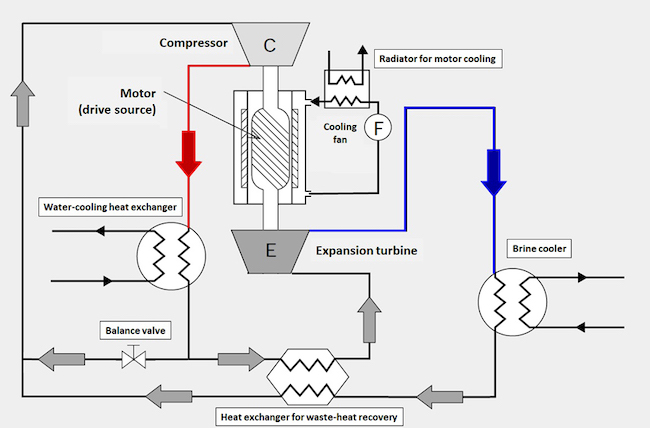Tag: Mitsubishi
MHI-AC&R Develops Large-Capacity Brine Refrigeration System for Cryo-Temperatures, Featuring Nitrogen (N2) Refrigerant

 |
The new system can refrigerate at ultra-low and cryo-temperatures (brine temperature: -45℃ to -100℃) through application of MHI-AC&R's proprietary (patented) air refrigeration cycle technology. The unit also features one of the industry's most compact sizes, enabling easy handling and transport. Its compression expansion machine incorporates MHI Group's accumulated high technologies in gas turbines. In addition to capturing the energy generated during air expansion cooling and using it as drive power, stable operation is achieved through the integration of high technologies such as energy-saving inverter control.
The new refrigeration system contributes significantly to curbing global warming through the adoption of N2, a natural refrigerant having zero environmental impact. In recent years, initiatives to prevent climate change have accelerated in momentum. In Japan, since April 2015, when the Act on Rational Use and Appropriate Management of Fluorocarbons(4) went into effect, the low-temperature refrigeration machine market has been called on to adopt low-GWP refrigerants. Internationally, in tandem with implementation of the Kigali Amendment to the Montreal Protocol on Substances that Deplete the Ozone Layer in January 2019, along with revisions to the Vienna Convention for the Protection of the Ozone Layer, production of chlorofluorocarbon (CFC) substitutes and phased reduction in energy consumption have become mandatory.
Today, because there are few refrigerant options in the ultra-low-temperature refrigeration field, many refrigeration systems continue to use CFC refrigerants. However, demand for CFC-free refrigeration systems is steadily rising in order to mitigate impact on the environment. The refrigerant used in MHI-AC&R's new refrigeration system uses nitrogen, which accounts for approximately 78% of air content, so it is safe both to the environment and to humans. Use of a CFC-free refrigerant also eliminates the inspection procedures mandated under the Act on Rational Use and Appropriate Management of Fluorocarbons, and the new refrigerant is also exempt from the High Pressure Gas Safety Act which regulates the production of high-pressure gases and their consumption, etc. Another benefit is the adoption of magnetic bearings in the system's compression expansion machine, which eliminates the need for lubricating oil and enables a virtually unlimited service life, thereby helping to ease the user's maintenance and operating burdens.
(1) ODP is a coefficient expressing a refrigerant's ozone depletion potential compared to the previously widely used CFC-11 (trichlorofluoromethane), which is assigned a value of 1.0. The lower the ODP value, the smaller is the deleterious impact on the ozone layer.
(2) GWP is a coefficient expressing a refrigerant's global warming potential compared to CO2, which is assigned a value of 1.0. The lower the GWP, the higher is the refrigerant's environmental performance.
(3) Based on MHI-AC&R's in-house survey.
(4) The Act on Rational Use and Proper Management of Fluorocarbons is a totally revised update, carried out in April 2015, to the original Fluorocarbons Recovery and Destruction Law enacted in 2001. Under the revised legislation, commercial refrigeration condensing units and stationary refrigeration units with a refrigeration capacity exceeding 1.5 kilowatt (kW) (approx. 2HP) are required by 2025 to adopt refrigerants with a GWP below 1500 (CO2 =1).
Delivery Overview
Client and destination: The Honjo Chemical Corporation, Naoshima Organic Chemical Plant
(Naoshima-cho, Kagawa-gun, Kagawa Pref.)
Intended usage: Removal of heat of reaction produced during production of organic chemicals
Specification: Brine temperature -80degC (down to -100degC)
About MHI Group
Mitsubishi Heavy Industries (MHI) Group is one of the world's leading industrial groups, spanning energy, logistics & infrastructure, industrial machinery, aerospace and defense. MHI Group combines cutting-edge technology with deep experience to deliver innovative, integrated solutions that help to realize a carbon neutral world, improve the quality of life and ensure a safer world. For more information, please visit www.mhi.com or follow our insights and stories on spectra.mhi.com.
Copyright 2022 JCN Newswire. All rights reserved. www.jcnnewswire.comMitsubishi Heavy Industries Air-Conditioning and Refrigeration Corporation (MHI-AC&R), a Group company of Mitsubishi Heavy Industries, Ltd. (MHI), has newly developed a large-capacity brine refrigeration system adopting a nitrogen (N2) refrigerant having both zero ozone depletion potential (ODP) and zero global warming potential (GWP).
Crypto Industry Maintained Activity in February Despite Geopolitical Tension (Report)
MHI Announces Changes in Executive-level Personnel

Mr. Ushida assumes the role of President & CEO after serving as Member of the Board and Senior Vice President of Commercial Engines since October 2020. He brings his more than 30 years of experience in MHI's aerospace business which includes multiple leadership roles ranging from manufacturing engineering, engine design to program management. He has also successfully grown MHIAEL's commercial engine maintenance, repair and overhaul (MRO) business to become one of the company's core businesses.
During his tenure as President & CEO, Mr. Shimauchi has successfully led the establishment of MHIAEL by ways of company split from MHI in October 2014 and managed to grow its revenues in three folds by 2019. He has also successfully navigated the company through one of the most challenging periods in aerospace history and formed a pathway for continued and further growth of the business including establishment of MHIAEL's second production site in Nagasaki.
Commenting on the appointment, Katsuyuki Shimauchi said, "The time has now come for me to step down and hand over to the next generation. Mr. Ushida is a tested leader who has successfully led our commercial engine programs with deep industry expertise and a fundamental understanding of our business. He also has a proven track record of building strong relationships with our stake holders, including customers and business partners. This is a crucial time for aero engine business, and I am very confident that he will help advance MHIAEL's further growth."
Masanori Ushida added, "I am honored to take up this opportunity at such an important time for MHIAEL. Under Mr. Shimauchi's strong leadership, MHI's aero engine business has grown significantly and strengthened our position in the aviation industry. Inheriting his great achievements, I look forward to continue working with our customers, business partners and our team to realize our full potential."
Copyright 2022 JCN Newswire. All rights reserved. www.jcnnewswire.comMitsubishi Heavy Industries Aero Engines, Ltd. (MHIAEL), a group company of Mitsubishi Heavy Industries, Ltd. (MHI) has announced the appointment of Masanori Ushida as President & Chief Executive Officer (CEO), effective April 1, 2022.
MHI Group Presents “Best Innovation 2021” Awards for Activities that Contribute to Mitigating Impacts on the Global Environment

MHI Group has adopted a corporate mission to "integrate cutting-edge technology into expertise built up over many years to provide solutions to some of the world's most pressing issues and provide better lives." Going forward, through its business activities the Company will continue to strive to resolve social issues and help achieve a sustainable society.
Of this year's 17 award-winning recipients, here we introduce 10 innovations related to the Company's strategic growth areas that will contribute to reduction of environmental impacts.
In 2020 MHI Group designated five items of "materiality": vital social issues whose resolution the Company should address as a means of enhancing its corporate value and achieving growth through the long term. Details are available at: https://www.mhi.com/sustainability/management/materiality.html
For more information, visit https://www.mhi.com/news/220304.html.
Copyright 2022 JCN Newswire. All rights reserved. www.jcnnewswire.comMitsubishi Heavy Industries, Ltd. (MHI) has presented its "Best Innovation 2021" awards to 17 products, technologies and services related to its Group business activities and growth strategies that contribute to the preservation and protection of the global environment and mitigation of environmental impacts, thereby contributing to realization of a carbon neutral society.
Japanese Financial Giant Nomura to Launch New Digital Asset Division

Japanese financial giant Nomura has announced its plans to launch a new digital asset division to look into the potential opportunities in the crypto sector. Nomura to Explore Crypto, NFTs With New Unit According to an official announcement, Nomura Holdings will be restructuring its Future Innovation Company into a new Digital Company, which will begin operations starting next month. With the new unit, the company will explore the possibilities of cryptocurrency, NFTs, security tokens, alongside technologies such as distributed ledgers to expand its private markets businesses. With a whopping value of almost $432 billion in total assets from the past year, Nomura might become one of the largest investors in blockchain technologies from the Asian region, alongside Animoca Brands. Commenting on the development, Nomura President and Group CEO, Kentaro Okuda, said: “Digital technology is a critical part of our strategic drive to expand our operations in private markets. The new Digital Company will lead deeper collaboration among internal and external stakeholders, accelerate our uptake of digital technologies, and enhance our client services.” Japan’s Budding Crypto and the NFT Market NFTs are becoming increasingly popular in Japan, despite the country having the most rigorous crypto regulations. For instance, Nomura Holdings recently became the latest Japanese financial company to explore NFTs. Similarly, Rakuten, a Japanese e-commerce company, announced the launch of its own NFT trading platform, Rakuten NFT, last week. Earlier last month, Japan’s largest bank Mitsubishi UFJ Financial Group (MUFG), announced it would terminate its three-year-old blockchain payment project to focus on issuing a Yen-backed stablecoin.
The post Japanese Financial Giant Nomura to Launch New Digital Asset Division appeared first on Cryptoknowmics-Crypto News and Media Platform.
Mitsubishi Shipbuilding Holds Christening and Launch Ceremony in Shimonoseki for Japan’s First LNG-fueled Ferry

 |
The SUNFLOWER KURENAI is 199.9m long and 28.0m wide, with gross tonnage of approximately 17,300. The vessel has capacity to accommodate 716 passengers, an estimated 137 13-meter trucks, and roughly 100 passenger cars. The main engine is a high-performance dual-fuel engine - the first of its kind featured on a domestic ferry - that can run on both liquefied natural gas (LNG) and A-type heavy oil. It offers outstanding environmental performance, achieving a 20% reduction in CO2 emissions and close to zero emissions of sulfur oxides (SOx), thereby mitigating environmental impact.
Compared to earlier ferries, the SUNFLOWER KURENAI also features significantly more loading capacity for trucks, a more spacious lounge for truck drivers, and substantially greater space per passenger. Expansive public areas include enlarged bathing facilities, a more spacious restaurant, and an atrium extending through three stories. In these and other ways, the new ferry responds to today's modal shift in the transport industry(Note1) while simultaneously achieving advances in the casual cruise business.
As part of MHI Group's strategic initiatives to advance the energy transition, Mitsubishi Shipbuilding is reducing the carbon footprint of the maritime industry through construction of LNG-fueled ships, as a way of contributing to realization of a carbon neutral society. Japan today is undergoing a modal shift from land transport to maritime transport in a quest to reduce carbon emissions as well as to offset a shortage of long-haul truck drivers and achieve workstyle reform. In tandem with this shift, demand is increasing for ferries and RoRo ships(Note2) and for ever-larger ships. Going forward, Mitsubishi Shipbuilding, as a maritime system integrator, will continue building fuel-efficient and environmentally harmonious ferries and cargo-passenger ships supporting stable operation, working closely with its business partners to solve diverse issues needing to be addressed.
(1) The transition underway in cargo transport away from reliance on trucks and other vehicles, toward increased use of trains and ships, which have a lighter environmental footprint.
(2) Roll-on Roll-off ship: a ship enabling loaded trucks, trailers, and other cargo vehicles to board and disembark directly, under their own power.
About MHI Group
Mitsubishi Heavy Industries (MHI) Group is one of the world's leading industrial groups, spanning energy, logistics & infrastructure, industrial machinery, aerospace and defense. MHI Group combines cutting-edge technology with deep experience to deliver innovative, integrated solutions that help to realize a carbon neutral world, improve the quality of life and ensure a safer world. For more information, please visit www.mhi.com or follow our insights and stories on spectra.mhi.com.
Copyright 2022 JCN Newswire. All rights reserved. www.jcnnewswire.comMitsubishi Shipbuilding Co., Ltd., a Mitsubishi Heavy Industries (MHI) Group company based in Yokohama, today held a christening and launch ceremony for the SUNFLOWER KURENAI, the first of two large LNG-fueled ferries being built for Mitsui O.S.K. Lines, Ltd. (MOL).
MHI Joins “ACT FOR SKY,” a voluntary organization working for the Commercialization, Promotion and Expansion of Domestically Produced SAF

 |
"ACT FOR SKY" with "ACT" representing the cooperation and collaboration by companies committed to take "action" for these goals-will aim to raise awareness among citizens and companies of the importance of SAF, carbon neutrality and achieving a circular economy. Applying expertise across relevant industries, the four founding companies will coordinate the activity of other member companies as well.
MHI is embarking on a project to develop a commercial-scale supply chain for sustainable aviation fuel (SAF) derived by biomass gasification integrated with FT synthesis technology(2). By achieving reduction in greenhouse gas emissions caused by jet fuels, the Company will contribute to mitigating the aviation industry's impact on the global environment.
Background
- A rapidly growing global need to reduce CO2 emissions has called for the aviation industry to accelerate the development, production, distribution, and use of SAF. This fuel is sourced from sustainable resources such as tallow (animal oils and fats), used cooking oil (UCO), biomass, municipal solid waste, exhaust gases, and CO2.
- As global SAF demand grows, a stable supply of domestically produced SAF is considered essential in Japan. However, domestically produced SAF has not been commercialized yet, and establishing stable supply chain, from procurement of feedstock to supply of SAF, remains an urgent issue.
- Compared to Europe and the U.S, where SAF is already being commercialized, and its awareness is relatively strong, it is necessary to raise the awareness of SAF in Japan as well.
Overview of activities
- Promotion of the members' activities toward decarbonization and a circular economy through the domestic production of SAF
- Discussions and analysis on the costs to achieve these goals
- Raise awareness on carbon neutrality, through local governments and education
- Exchanging information among members, for next actions
- Share information on how other countries are acting for SAF promotion
- Identify common issues for domestic SAF production, and share the information and analysis gathered with related organizations
Specific member initiatives
ACT FOR SKY consists of the following 16 members (as of March 2, 2022).
"ACT" member companies: Companies/organizations directly involved in domestic SAF business
(founding companies in bold)
Future development
Along with a variety of other stakeholders, ACT FOR SKY will promote and expand the domestic production of SAF, which will lead to the development of aviation network in Japan and the industry related to SAF production. Together, we will establish a sustainable society.
ACT FOR SKY logo
Created by: Housui Yamaguchi, calligrapher
Behind the logo design:
Blue ink: A beautiful blue sky
Calligraphic style: Dynamic, linked to action
Symbolism of calligraphy: Japan, domestic production
(1) SAF is a fuel achieving significantly lower CO2 emissions compared to the conventional jet fuel over its life cycle, from production or collection of feedstock (such as biomass, used cooking oil, or exhaust gas) to manufacturing and combustion. Existing infrastructure can be used without modification.
(2) Gasification and FT (Fischer-Tropsch) synthesis technology: a technology whereby solid materials such as wood cellulose are reacted with water vapor and a small amount of oxygen in a gasifier to produce carbon monoxide and hydrogen (gasification), which are then synthesized into liquid hydrocarbons (fuel) in an FT reactor using a catalyst (Fischer-Tropsch Process).
About MHI Group
Mitsubishi Heavy Industries (MHI) Group is one of the world's leading industrial groups, spanning energy, logistics & infrastructure, industrial machinery, aerospace and defense. MHI Group combines cutting-edge technology with deep experience to deliver innovative, integrated solutions that help to realize a carbon neutral world, improve the quality of life and ensure a safer world. For more information, please visit www.mhi.com or follow our insights and stories on spectra.mhi.com.
Copyright 2022 JCN Newswire. All rights reserved. www.jcnnewswire.comMitsubishi Heavy Industries, Ltd. (MHI) is pleased to announce that today it has joined "ACT FOR SKY," a voluntary organization established jointly by JGC Holdings Corporation Co.,Ltd., REVO International Inc.
MHI Receives Silver Rating in EcoVadis 2022 Sustainability Survey for Third Consecutive Time

EcoVadis provides buyer companies with evaluation data on the sustainability measures of more than 85,000 companies from 200 industries in 160 countries via a global cloud-based platform. Many global companies refer to these ratings when selecting a supplier. Through this rating, MHI Group has been able to enhance its presence in global markets as a sustainable supplier.
On October 1, 2021, MHI Group established a new "Materiality Council" and "Sustainability Committee" to support the dual aims of achieving a sustainable world, and enhancing its corporate value over the longer term. This structure was created in consideration of calls from the international community, institutional investors, and other stakeholders for greater environmental, social, and economic sustainability from the corporate sector, as well as to further strengthen MHI Group's sustainability management system centered on the issues and values of modern society. As a result, MHI has been highly rated among ESG evaluation agencies throughout the world, and selected for inclusion in ESG indexes in Japan and overseas.
Going forward, MHI Group will take advantage of this Silver rating to further focus on sustainability measures, pursuing growth as a company that is trusted by stakeholders, and contributes to the realization of a dependable future for people and the planet, and a sustainable world.
About MHI Group
Mitsubishi Heavy Industries (MHI) Group is one of the world's leading industrial groups, spanning energy, logistics & infrastructure, industrial machinery, aerospace and defense. MHI Group combines cutting-edge technology with deep experience to deliver innovative, integrated solutions that help to realize a carbon neutral world, improve the quality of life and ensure a safer world. For more information, please visit www.mhi.com or follow our insights and stories on spectra.mhi.com.
Copyright 2022 JCN Newswire. All rights reserved. www.jcnnewswire.comMitsubishi Heavy Industries, Ltd. (MHI) has received a "Silver" rating in the 2022 sustainability assessment conducted by EcoVadis, an international evaluation organization based in France.
Mitsubishi UFJ Drops Blockchain Project, To Launch Crypto Wallet
 Mitsubishi UFJ Financial Group is set to launch its digital asset wallet. The finance giant earlier announced that it is ...
Mitsubishi UFJ Financial Group is set to launch its digital asset wallet. The finance giant earlier announced that it is ... Mitsubishi Heavy Industries and Institut Teknologi Bandung Extend Collaboration to Drive Decarbonization in Indonesia

 |
 |
The online signing ceremony took place on February 7, 2022 and was attended by the Ambassador of Indonesia to Japan, H.E. Heri Akhmadi; the Ambassador of Japan to Indonesia, H.E. Kenji Kanasugi; ITB Rector, Ms. Reini Wirahadikusumah; and MHI's Head of Energy Transition and Power Headquarters, Ken Kawai.
MHI's Head of Energy Transition and Power Headquarters Ken Kawai said, "MHI has been at the forefront of supporting Indonesia in its energy transition for nearly half a century. Through this continued partnership with ITB, we seek to develop clean energy solutions that will accelerate decarbonization in Indonesia. I am looking forward to a fruitful collaboration with ITB to achieve our mission net zero."
ITB Rector, Ms. Reini Wirahadikusumah added: "During the past two years, we have been collaborating with MHI to conduct advanced feasibility studies in clean energy, especially in financial and technical evaluation of ammonia and biomass co-firing. I am sure that these activities will benefit the Indonesian power industry. I hope that the extension of this MOU will create more ideas and useful recommendations for Indonesia's decarbonization journey."
A previous MOU between MHI and ITB(1) enabled joint feasibility studies on emerging energy sources such as hydrogen and ammonia, as well as air quality control systems (AQCS) and microgrid solutions. Since this MOU was signed in 2020, MHI and ITB also collaborated on training Indonesia's future engineers by conducting joint lectures on topics including big data analysis, biomass, integrated coal gasification combined cycle, hydrogen and AQCS.
This new MOU comes at a time when Indonesia is ramping up efforts to decarbonize its energy sector evident in its recent commitments to reduce its greenhouse gas emissions by 29% by 2030 and achieve 23% renewable energy use by 2025(2).
(1) https://power.mhi.com/news/20200130.html
(2) bit.ly/3BmvFTP
Copyright 2022 JCN Newswire. All rights reserved. www.jcnnewswire.comMitsubishi Heavy Industries, Ltd. (MHI) has concluded a memorandum of understanding (MOU) with Indonesia's Institut Teknologi Bandung (ITB) to conduct joint research on clean energy solutions that will enable decarbonization in Indonesia.
Mitsubishi Shipbuilding Completes Conceptual Study on Floating Storage and Regasification Unit (FSRU) for Ammonia Together with Mitsui O.S.K. Lines

 |
Ammonia FSRU is a floating facility for receiving and storing ammonia which is transported in a liquid state from its production area, and the stored ammonia is then heated and regasified onboard for transfer to an onshore pipeline. Ammonia FSRU can be constructed at a lower cost and in a shorter time than onshore ammonia storage and regasification plants. At a time when global interest in usage of ammonia is increasing, the application of Ammonia FSRU in place of onshore storage and regasification plants is expected to contribute to earlier and stable supply of ammonia fuel.
In the newly completed conceptual study, Mitsubishi Shipbuilding conducted multiple case studies of FSRU which have different specifications according to the ammonia's supply conditions, regasification method, tank capacity, etc., in order to respond to a wide range of demands, and eventually developed designs of more environmentally friendly Ammonia FSRU. The study also covered the feasibility of employing ammonia fuel to generate the power required for the operation of the FSRU itself.
In addition, Mitsubishi Shipbuilding has just concluded a memorandum of understanding (MOU) with MOL and The Kansai Electric Power Co., Inc. whereby the parties will examine the possibilities of future introduction of Ammonia FSRU. They are aiming at realization of the first Ammonia FSRU in the world, making the most of Mitsubishi Shipbuilding's expertise in ammonia handling technologies.
Ammonia is now mainly used as a raw material of fertilizers, and although the volume of maritime transportation is limited so far, the demand is expected to increase in the future as a next-generation clean energy that does not emit CO2 when burned. In the global trend toward decarbonization, movements toward making strategic use of ammonia are increasing, especially in Asia.
Going forward, according to MHI Group's strategy of advancement of the energy transition, Mitsubishi Shipbuilding will strive to promote decarbonization of the maritime industry as well as to contribute to realizing a carbon-neutral society and reduction of environmental load on a global scale, by utilizing its technologies and expertise in ammonia handling accumulated through its long experience in building multi-gas carriers for transporting LPG and ammonia.
About MHI Group
Mitsubishi Heavy Industries (MHI) Group is one of the world's leading industrial groups, spanning energy, logistics & infrastructure, industrial machinery, aerospace and defense. MHI Group combines cutting-edge technology with deep experience to deliver innovative, integrated solutions that help to realize a carbon neutral world, improve the quality of life and ensure a safer world. For more information, please visit www.mhi.com or follow our insights and stories on www.spectra.mhi.com.
Copyright 2022 JCN Newswire. All rights reserved. www.jcnnewswire.comMitsubishi Shipbuilding Co., Ltd., a part of Mitsubishi Heavy Industries (MHI) Group, has completed a conceptual study, in a joint effort with Mitsui O.S.K. Lines, Ltd. (MOL), on floating storage and regasification unit (FSRU) for ammonia.
Capstone Announces the Filing of its Management Information Circular in Connection with its Special Meeting to Approve the Business Combination with Mantos Copper
The management information circular and related materials ( the “Meeting Materials”) have been filed by the Capstone Mining Corp. (“Capstone” or the “Company”) on SEDAR and are available under the Company’s profile at www.sedar.com and on the Company’s website at Capstone Mining – Investors – Special Meeting of Shareholders For any questions please contact Capstone’s’ […]
The post Capstone Announces the Filing of its Management Information Circular in Connection with its Special Meeting to Approve the Business Combination with Mantos Copper appeared first on Fintech News.




